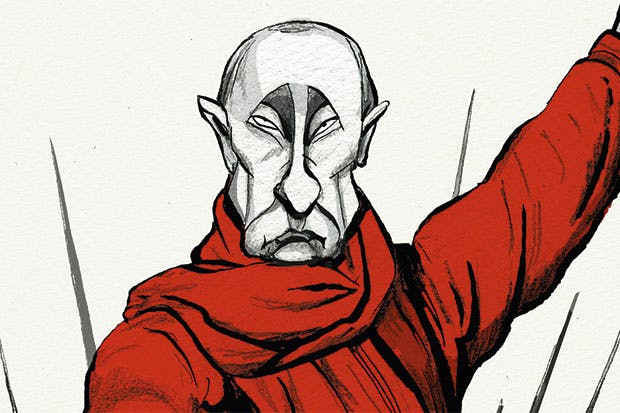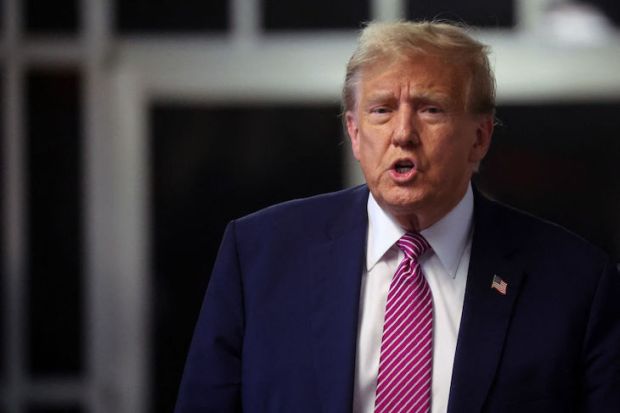‘If you don’t like how the table is set, turn over the table,’ said Frank Underwood, the Machiavellian character played by Kevin Spacey in the US version of House of Cards. One needs to look no further than Vladimir Putin’s body language in his recent meeting with defence minister Sergei Shoigu to conclude that Russia’s ‘special military operation’ in Ukraine is not going according to plan. While that is good news, the Russian dictator might be moving to turn over the table in the neighbouring Moldova.
On Tuesday morning, two explosions destroyed a radio tower re-broadcasting Russian stations into Transnistria and Ukraine and a ‘terror attack’ targeted a military unit near the capital of the self-declared republic. The two incidents followed earlier blasts, on Monday evening, by Transnistria’s ‘ministry of state security.’
Given that the dispute over Transnistria has been frozen for decades and that Moldova’s armed forces are next to non-existent, the most obvious explanation for the attacks is that they are a Russian false-flag operation laying the groundwork for a different phase of Putin’s effort to reconstitute the Russian empire.
Russians, after all, have also blown up the only bridge over the Dniester River in Ukraine, connecting the area around Odessa with the small part of Ukraine territory on the Black Sea coast just south of Moldova. That would allow them to land troops in a remote part of Ukraine and move them via Transnistria to either secure control of Moldova itself or use them for a future siege of Odessa, a vital Ukrainian seaport.
After the spectacular failure of Russian efforts to capture Ukraine in what was supposed to be a swift intervention facing little organised resistance, picking on another independent nation in Eastern Europe may seem like a very risky proposition. But given Moldova’s poverty, small size, and lack of effective defences, presence of influential pro-Russian forces in the country’s politics – and ubiquity of Russian propaganda – it is perfectly imaginable that an operation featuring ‘little green men,’ as seen in Crimea in 2014, might succeed in deposing the young pro-western president Maia Sandu and her centre-right parliamentary majority.
It is telling that in the first days of invasion, Russian paratroopers made multiple landings around Kyiv, only to be decimated by Ukrainian forces. The paratrooper units are used primarily for crowd-control and intimidation of civilians – less for actual warfare – suggesting that the Kremlin had been planning for an operation similar to the crushing of civil unrest in Kazakhstan to prop up the regime of the Moscow-friendly Kassym-Jomart Tokayev.
The fact that Putin picked the wrong target with Ukraine does not mean that the same playbook will not work in the largely defenceless Moldova. Since 2014, successive Ukrainian governments were preparing for the current war, seeing it as inevitable. Moldova’s politics, in contrast, have been torn between a Soviet nostalgia, complete with communist symbols and former apparatchiks, and pro-western, reformist forces that have only had success in pushing effective political and economic reforms in recent years.
Putin is racing against the clock. Both the Ukrainian resistance and the western response are inflicting severe political and economic costs on the regime, far beyond anything the Kremlin planned for. There is every indication that the Russian dictator wants to declare victory by V-Day, 9 May, offering Ukraine a ceasefire that he hopes western powers will somehow strong-arm Volodymyr Zelensky into accepting. Claiming Moldova together with Ukraine’s Bessarabia, right on the border with Romania, makes for a perfect start for future efforts to take Ukraine’s Black Sea Coast. And, unlike the pitiful territorial gains made in Ukraine, typically at the cost of razing urban centres to the ground, a ‘clean’ capture of yet another former Soviet republic might be precisely the kind of symbolic prize that could give him breathing space and security at home.
It is a dangerous gamble but not a preposterous one, if Putin’s track record is any guide. To dismiss it and not to provide Moldova with last-minute military assistance or another tripwire that might increase the costs of a prospective attack to the Russians would be a terrible failure of imagination. Alas, it would not be the first one suffered by western leaders on the Eastern front.
Got something to add? Join the discussion and comment below.
Get 10 issues for just $10
Subscribe to The Spectator Australia today for the next 10 magazine issues, plus full online access, for just $10.




















Comments
Don't miss out
Join the conversation with other Spectator Australia readers. Subscribe to leave a comment.
SUBSCRIBEAlready a subscriber? Log in